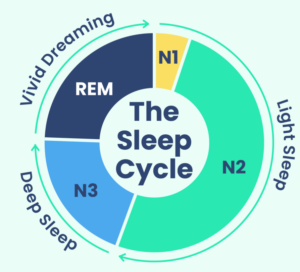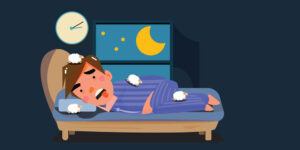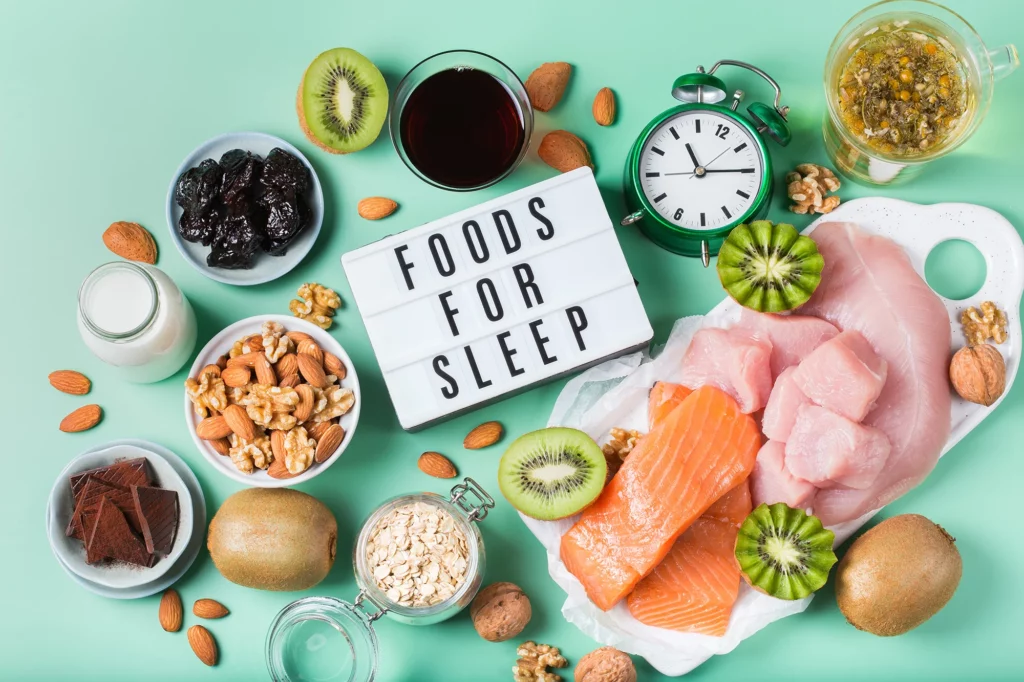A good night’s sleep is like hitting the reset button for your body and mind.
It’s not just about catching some Z’s, but about giving your body what it needs to function at its best.
I’m going to lay it out straight: sleep isn’t just a luxury—it’s a necessity!
This is especially true for men, who often face unique health challenges that can be amplified by poor sleep.
If you have trouble just getting to sleep, then try the Military method.
So how do military personel get to sleep fast?
The military sleep method involves the following steps:
- Breathe deeply:
- Close your eyes and focus on your breathing.
- Take slow, deep breaths.
- Relax your entire face, including the muscles inside your mouth.
- Drop your shoulders to release the tension, and let your hands drop to the side of your body.
- Exhale, relaxing your chest.
- Relax your legs, thighs, and calves.
- Clear your mind for 10 seconds by imagining a relaxing scene.

Okay wakey, wakey.
Now lets have a look at why those eight hours of shut-eye are more than just a break from your busy day.
From muscle repair to mental clarity and emotional stability, sleep plays a crucial role in nearly every facet of a man’s health.
And it’s not just about quantity—quality matters too.
But here’s the deal: not all sleep is created equal.
Men’s sleep needs can be different from women’s because of various factors, including hormonal cycles, physical demands, and risk of certain health conditions.
Recognizing these differences is key to understanding how sleep impacts men’s health specifically.
So, as we delve into the physiology of sleep next, keep in mind that it’s about more than just biology.
It’s a complex interplay of chemistry, hormones, and biology that altogether define the healing power of sleep. Getting this insight will help any man optimize his sleep for better health and well-being.
The Physiology of Sleep: What Men Need to Know
I’m going to take you through the essentials of sleep physiology and why it matters specifically for men.
It’s not just about getting rest; it’s about understanding what happens to your body during those crucial hours of shut-eye.
In the realm of sleep, there are several stages, each vital for different aspects of health. Rapid Eye Movement (REM) and Non-REM sleep play distinct roles, from memory consolidation to physical restoration.
Now, why should men pay special attention? Because the quality of these cycles can seriously impact your hormonal health, including testosterone levels, which are critical for muscle development, libido, and overall energy.
You will see that your body’s time for repair and growth primarily happening during Non-REM sleep, especially when in the deep stage. This is the time when your body is doing most of its muscle repair and recovery.

There are three Non-REM stages.
When you first fall asleep, you enter Non-REM stage 1 and then cycle between Non-REM stages 2 and 3.
You then go into REM sleep and start dreaming.
After the first REM cycle, you the cycle starts over again & normally this happens four to five times a night, in an eight hour sleep period
Non-REM :
Stage 1 is light sleep & is very short, just a few minutes
Stage 2 is deeper sleep & is longer, with the length of time spent, increasing with each cycle
Stage 3 is the deepest stage & the most important. Your body uses this very deep sleep to rejuvernate, repair injuries and reinforce your immune system.
You need Stage 3 sleep to wake up feeling properly rested. Without enough of it, you feel tired and drained even if you slept for a long time. This is why your body tries to get as much stage 3 sleep into your sleeping period as early as possible.
For men who are active within their work or regularly working out, quality sleep is non-negotiable.
Remember, it’s not just the amount of sleep that counts, but the quality.
Disruptive sleep patterns can mess with your hormones, leaving you feeling out of sorts and impacting your physical and mental performance. It’s about creating a consistent routine to support these natural cycles, which, in turn, supports your overall health.
Sleep Deficiencies and Men’s Health Risks
I’m going to guide you through the silent hazards that lurk in the shadows of sleep deprivation.
That’s right, consistently missing out on good shut-eye can put men on a collision course with some serious health issues.

Too little sleep can:
- Increase insulin resistance.
- Make you hungrier the next day and reduce how full you feel after eating.
- Make you more likely to reach for junk foods—those that are high in carbs and sugar.
- Make it harder to lose weight.
- Raise blood pressure and seriously increase the risk of a heart attack.
- Make your immune system less able to fight infections.
- Increase your risk of depression and anxiety.
First up, let’s talk about the heart. You see, sleep is like a rest period for your ticker.
Skimp on sleep, and you’re inviting high blood pressure and heart disease to the party.
In my opinion, no one should be rolling out the welcome mat for these guests.
Then there’s the matter of your metabolism. If you’re wrestling with weight, you should know that poor sleep can mess with the hormones that control appetite, leading to weight gain. You’re going to find out about how sleep deprivation can lead to insulin resistance, too, which is a stepping stone to type 2 diabetes.
We can’t ignore the brain either. Sleep deprivation doesn’t just make men grumpy; it’s also linked to mood swings, anxiety, and depression. Plus, if you’re wondering about focus and memory, guess what? They are severely hampered when you’re not well-rested.
Now, I’m not here to scare you, but to help you understand that these risks are preventable. That’s going to include some lifestyle tweaks we’ll explore in the next section. Stick with me, and I’ll show you how to turn the tide on sleepless nights and safeguard your health.
Lifestyle Adjustments to Enhance Sleep Quality
You’re going to find out about practical steps to take control of your sleep health. It’s not just about getting more hours; it’s also about enhancing the quality of your sleep. Choosing something that resonates with you can make all the difference in your routine.
Ever thought about where you sleep as a factor in how well you sleep? It’s true.
One of the best things you can do is to wake up and go to bed at around the same time every day, even on weekends, making sure you get enough quality sleep consistently.
Creating an optimal sleep environment, so invest in a comfortable mattress and pillows that support your sleeping style.
Then use these tips to help you get the sleep that you require:
- Keep your bedroom dark, quiet, relaxing, and cool. A temperature of 65 degrees is recommended for your best rest.
- Get rid of electronic devices such as TVs, computers, and smartphones from the bedroom.
- Try & do some physical activity during the day.
- Mentally unwind and try to relax before heading off to bed.
- Have a routine that gets you ready for bed, like taking a shower or reading for a bit.
- Get in bed only when you’re tired, don’t try & force it. Lying there wide awake for hours really doesn’t help.
Your diet isn’t just about your waistline; it affects your sleep too. Foods high in tryptophan, magnesium, and certain vitamins can promote better sleep.

Here’s some tips on what to avoid to get a good nights sleep :
- Reduce caffeine and alcohol intake, especially in the hours leading up to bedtime.
- Avoid large meals late at night. Eating late can cause indigestion and higher blood sugar levels overnight.
- Don’t have a nap after 3 p.m. This can make you less tired when it’s time for bed.
If you want to really own your sleep health, stick to a sleep schedule. Remember that going to bed and waking up at the same time each day sets your body’s internal clock to expect sleep.
Over time, this consistency can significantly improve your sleep quality.
Professional Insight: When to Seek Help for Sleep Issues
I’m going to lay it out straight: sleep isn’t just a luxury—it’s a necessity.
Especially for us guys, the stakes can be high if we shrug off sleep problems.
It’s crucial to know when to call in the pros.
Think about it; snoring might not just be a minor annoyance. It could be a sign of something more serious like sleep apnea.
Left unchecked, sleep apnea can increase your risk for a whole host of health troubles, including heart conditions.
Still, sleep troubles aren’t always as loud and clear as snoring.
Subtler signs, such as persistent daytime grogginess or difficulty concentrating, might also signal it’s time to seek help.
Now what is a big deal? Your wellbeing.
Licensed health professionals are trained to spot and treat sleep disorders. They can provide personalized plans maybe involving cognitive behavioral therapy for insomnia (CBT-I) or other evidence-based interventions.

If you’re feeling stuck on your journey to better sleep, consider a sleep clinic. I’m here to help you with understanding that these are not just places for people with severe sleep disorders. They offer support and solutions for anyone wanting to get their sleep—and health—back on track.
So my question to you today is, have you paid attention to your sleep?
If you’re continuously running on low, it might be time to reach out.
Remember, acknowledging the need for help isn’t a weakness; it’s a strong step toward better health.
I’d love to hear your feedback on this topic or your experiences with improving sleep. And remember, don’t worry too much about perfect nights; aiming for restful sleep is already a leap in the right direction
Thanks for reading & I hope you found this article helpful. If you have any questions or comments, feel free to leave them below & I will get back to you.




